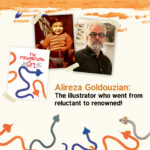In her captivating YA novel “Beyond the Sea of the Dead,” originally published in Farsi by TUTI Books, author Masoumeh Miraboutalebi presents readers with a profound exploration of mortality, drawing inspiration from the influential philosophical ideas of Gilbert Durand.
At the heart of the narrative is the protagonist, Afshin, whose haunting journey of self-discovery serves as a vehicle for the author to grapple with the complex interplay between the fear of death and the transformative power of the imagination.
Durand’s Dual Regimes of the Imagination
Miraboutalebi skillfully incorporates Durand’s theories on the dual regimes of the imagination into the fabric of her storytelling.
The diurnal regime, represented by the ominous “Sea of the Dead,” embodies the universal human dread of the inevitable, while the nocturnal regime, embodied by the serene “Meadow of Remembrance,” acts as a moderator of this primal fear.
Through the use of evocative symbolic imagery, the author confronts her young adult audience with a multifaceted portrayal of the experience of mortality, challenging them to confront their own deeply held beliefs and anxieties about death.
Afshin’s Journey of Confronting Mortality
After the loss of his beloved mother in a tragic accident, Afshin has been grappling with a profound sense of guilt, unable to fully navigate the process of mourning. When he learns of his grandfather’s illness, Afshin is thrust into a new journey of reckoning with his own mortality, driven by a desperate desire to prevent another devastating loss.
The recurring motif of the blackbird, a harbinger of death, serves as a haunting presence throughout Afshin’s odyssey, mirroring his internal struggle to come to terms with the inevitability of death. As he navigates between the diurnal dread of the “Sea of the Dead” and the nocturnal solace of the “Meadow of Remembrance,” Afshin’s journey reflects the universal human experience of confronting the realities of mortality.
Addressing the Psychological Impact of Death on Youth
Miraboutalebi’s novel touches upon the complex psychological and emotional impact that the concept of death can have on children and adolescents. The author deftly explores the consequences of an “imperfect understanding of the concept of death in children,” which can lead to a debilitating sense of guilt in the face of the loss of a loved one.
By delving into Afshin’s experiences, the novel sheds light on the importance of guiding young readers through the process of mourning and providing them with a more nuanced understanding of the biological, social, and cultural aspects of death.
The Transformative Power of Imagination
At the heart of “Beyond the Sea of the Dead” lies Miraboutalebi’s exploration of the transformative power of the imagination in confronting the most fundamental questions of human existence. By drawing on Durand’s theories, the author has crafted a work that invites readers to delve into the depths of their own mortality, ultimately offering a glimmer of hope and a deeper understanding of the human condition.
Reviewers have praised the novel’s ability to balance the heavy subject matter with emotional resonance, creating a reading experience that is both intellectually stimulating and deeply moving. “Beyond the Sea of the Dead” stands as a testament to the enduring ability of literature to grapple with the universal human experience of life, death, and the boundless potential of the human mind.
[Adapted from the article “Examining the Role of Artistic Images in the Rational Confrontation of the Adolescent Audience with the Concept of Death Based on the Model of Imagination System Structures from the Perspective of Gilbert Durand (Case Study: “Beyond the Sea of the Dead” Novel)” by Ayyoub Moradi and Sara Chalak, published in the biannual journal “Thinking and Children”.]


